Western Governors University US History Task 2 Analysis
VerifiedAdded on 2023/05/30
|7
|1488
|130
Homework Assignment
AI Summary
This assignment analyzes the challenges of partisan politics and sectionalism in the Early Republic and Civil War eras. It begins by examining the reasons behind the emergence of partisan politics during George Washington's first term, highlighting the contrasting views of the Federalists and Anti-Federalists. The assignment then delves into the development of the Second Party System, comparing the platforms of the Whig and Democratic parties, and describing their leaders and constituents. It explores how the Second Party System contributed to the democratization of politics in America. Furthermore, the assignment elaborates on the events that contributed to the Civil War, including the arguments of pro-slavery and abolitionist factions, the role of Western expansion in increasing sectional tensions, and the impact of political debates, court cases, and significant legislation in triggering the conflict. The analysis provides a comprehensive overview of the key factors that shaped this pivotal period in American history.
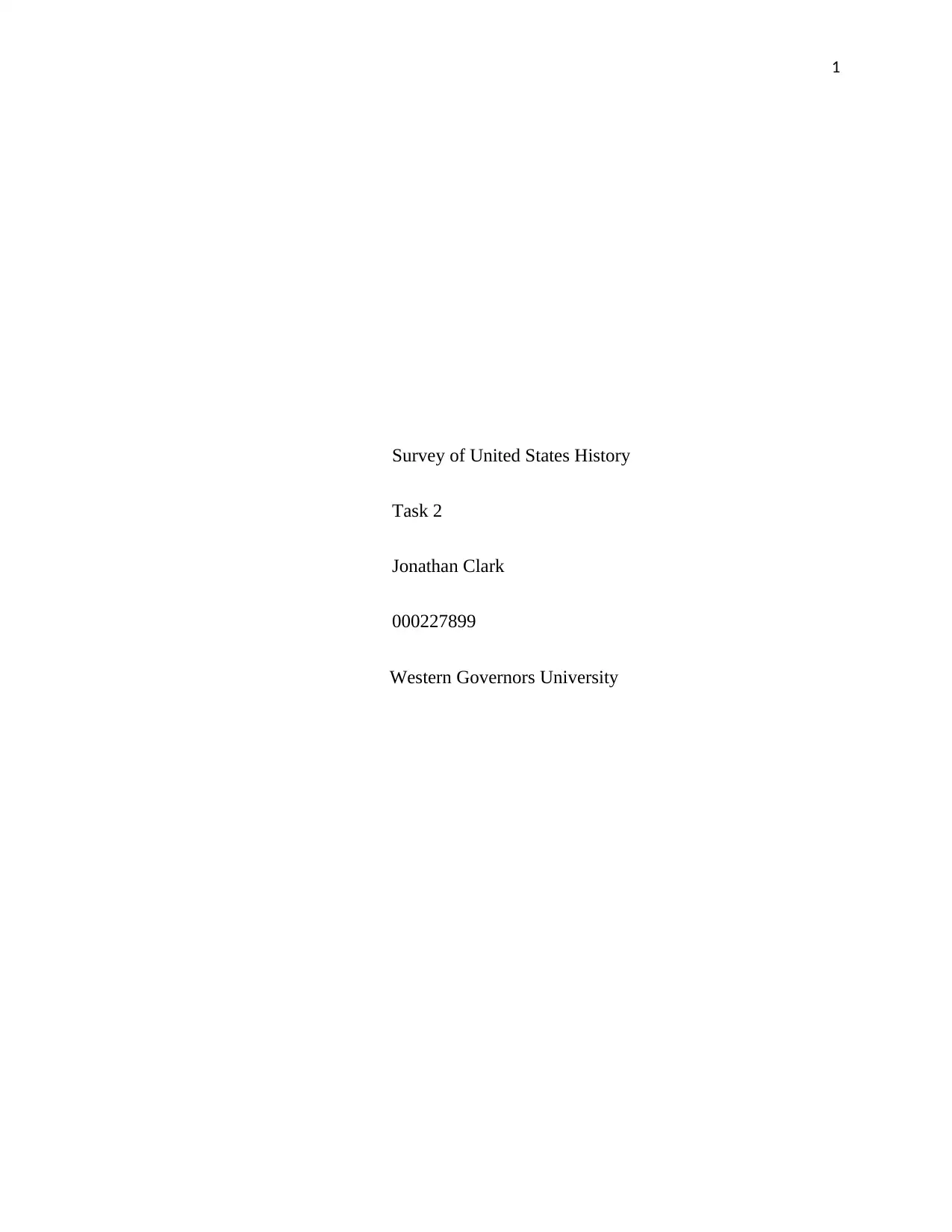
1
Survey of United States History
Task 2
Jonathan Clark
000227899
Western Governors University
Survey of United States History
Task 2
Jonathan Clark
000227899
Western Governors University
Paraphrase This Document
Need a fresh take? Get an instant paraphrase of this document with our AI Paraphraser
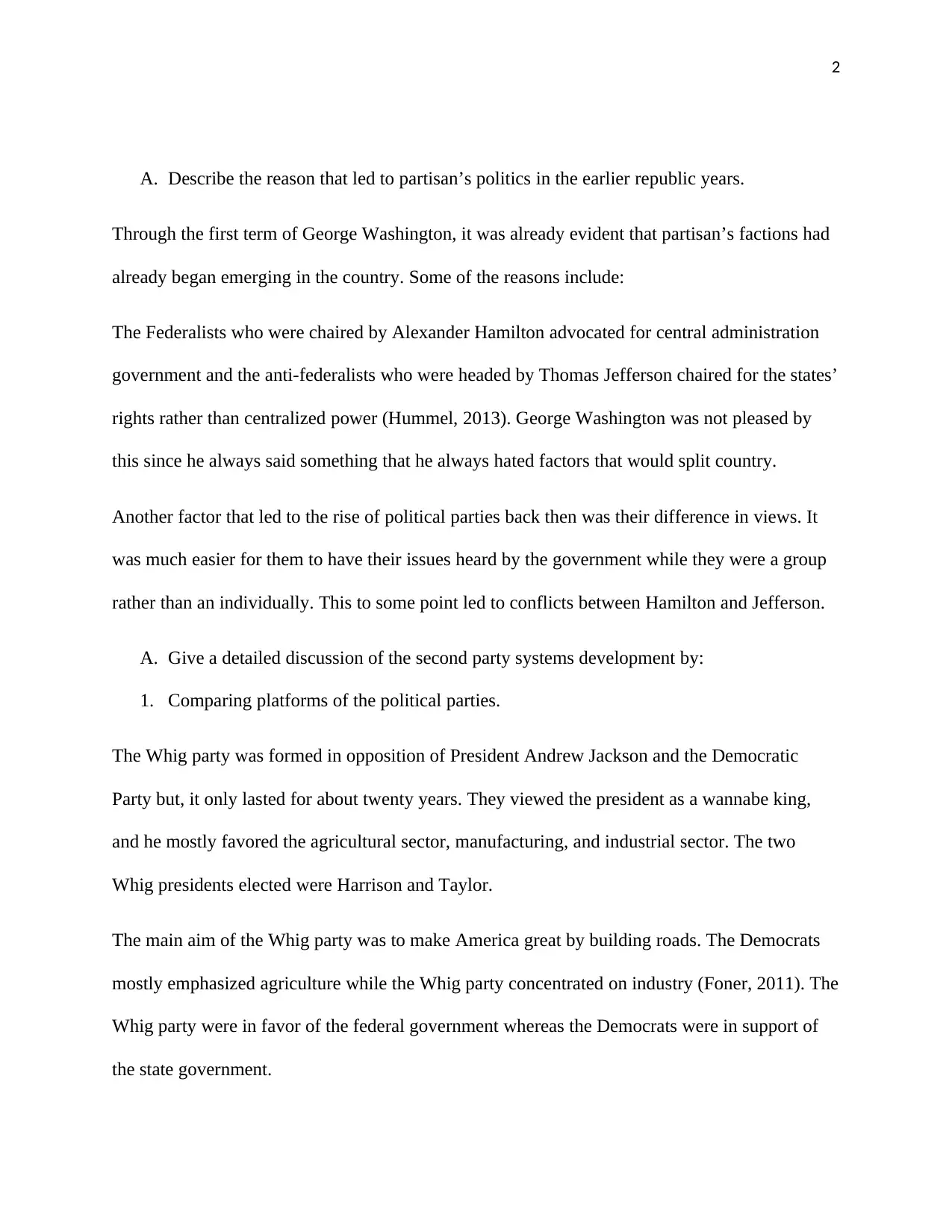
2
A. Describe the reason that led to partisan’s politics in the earlier republic years.
Through the first term of George Washington, it was already evident that partisan’s factions had
already began emerging in the country. Some of the reasons include:
The Federalists who were chaired by Alexander Hamilton advocated for central administration
government and the anti-federalists who were headed by Thomas Jefferson chaired for the states’
rights rather than centralized power (Hummel, 2013). George Washington was not pleased by
this since he always said something that he always hated factors that would split country.
Another factor that led to the rise of political parties back then was their difference in views. It
was much easier for them to have their issues heard by the government while they were a group
rather than an individually. This to some point led to conflicts between Hamilton and Jefferson.
A. Give a detailed discussion of the second party systems development by:
1. Comparing platforms of the political parties.
The Whig party was formed in opposition of President Andrew Jackson and the Democratic
Party but, it only lasted for about twenty years. They viewed the president as a wannabe king,
and he mostly favored the agricultural sector, manufacturing, and industrial sector. The two
Whig presidents elected were Harrison and Taylor.
The main aim of the Whig party was to make America great by building roads. The Democrats
mostly emphasized agriculture while the Whig party concentrated on industry (Foner, 2011). The
Whig party were in favor of the federal government whereas the Democrats were in support of
the state government.
A. Describe the reason that led to partisan’s politics in the earlier republic years.
Through the first term of George Washington, it was already evident that partisan’s factions had
already began emerging in the country. Some of the reasons include:
The Federalists who were chaired by Alexander Hamilton advocated for central administration
government and the anti-federalists who were headed by Thomas Jefferson chaired for the states’
rights rather than centralized power (Hummel, 2013). George Washington was not pleased by
this since he always said something that he always hated factors that would split country.
Another factor that led to the rise of political parties back then was their difference in views. It
was much easier for them to have their issues heard by the government while they were a group
rather than an individually. This to some point led to conflicts between Hamilton and Jefferson.
A. Give a detailed discussion of the second party systems development by:
1. Comparing platforms of the political parties.
The Whig party was formed in opposition of President Andrew Jackson and the Democratic
Party but, it only lasted for about twenty years. They viewed the president as a wannabe king,
and he mostly favored the agricultural sector, manufacturing, and industrial sector. The two
Whig presidents elected were Harrison and Taylor.
The main aim of the Whig party was to make America great by building roads. The Democrats
mostly emphasized agriculture while the Whig party concentrated on industry (Foner, 2011). The
Whig party were in favor of the federal government whereas the Democrats were in support of
the state government.
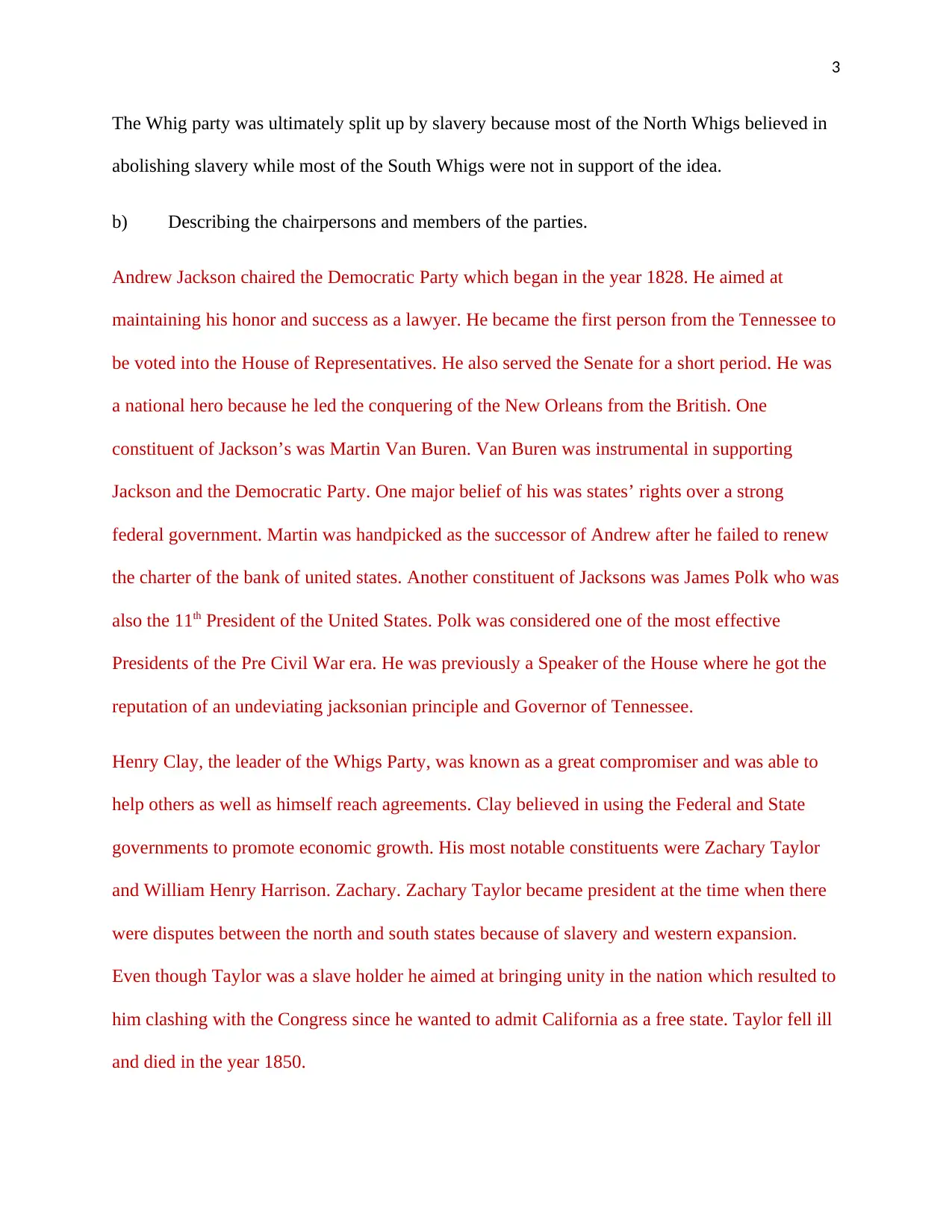
3
The Whig party was ultimately split up by slavery because most of the North Whigs believed in
abolishing slavery while most of the South Whigs were not in support of the idea.
b) Describing the chairpersons and members of the parties.
Andrew Jackson chaired the Democratic Party which began in the year 1828. He aimed at
maintaining his honor and success as a lawyer. He became the first person from the Tennessee to
be voted into the House of Representatives. He also served the Senate for a short period. He was
a national hero because he led the conquering of the New Orleans from the British. One
constituent of Jackson’s was Martin Van Buren. Van Buren was instrumental in supporting
Jackson and the Democratic Party. One major belief of his was states’ rights over a strong
federal government. Martin was handpicked as the successor of Andrew after he failed to renew
the charter of the bank of united states. Another constituent of Jacksons was James Polk who was
also the 11th President of the United States. Polk was considered one of the most effective
Presidents of the Pre Civil War era. He was previously a Speaker of the House where he got the
reputation of an undeviating jacksonian principle and Governor of Tennessee.
Henry Clay, the leader of the Whigs Party, was known as a great compromiser and was able to
help others as well as himself reach agreements. Clay believed in using the Federal and State
governments to promote economic growth. His most notable constituents were Zachary Taylor
and William Henry Harrison. Zachary. Zachary Taylor became president at the time when there
were disputes between the north and south states because of slavery and western expansion.
Even though Taylor was a slave holder he aimed at bringing unity in the nation which resulted to
him clashing with the Congress since he wanted to admit California as a free state. Taylor fell ill
and died in the year 1850.
The Whig party was ultimately split up by slavery because most of the North Whigs believed in
abolishing slavery while most of the South Whigs were not in support of the idea.
b) Describing the chairpersons and members of the parties.
Andrew Jackson chaired the Democratic Party which began in the year 1828. He aimed at
maintaining his honor and success as a lawyer. He became the first person from the Tennessee to
be voted into the House of Representatives. He also served the Senate for a short period. He was
a national hero because he led the conquering of the New Orleans from the British. One
constituent of Jackson’s was Martin Van Buren. Van Buren was instrumental in supporting
Jackson and the Democratic Party. One major belief of his was states’ rights over a strong
federal government. Martin was handpicked as the successor of Andrew after he failed to renew
the charter of the bank of united states. Another constituent of Jacksons was James Polk who was
also the 11th President of the United States. Polk was considered one of the most effective
Presidents of the Pre Civil War era. He was previously a Speaker of the House where he got the
reputation of an undeviating jacksonian principle and Governor of Tennessee.
Henry Clay, the leader of the Whigs Party, was known as a great compromiser and was able to
help others as well as himself reach agreements. Clay believed in using the Federal and State
governments to promote economic growth. His most notable constituents were Zachary Taylor
and William Henry Harrison. Zachary. Zachary Taylor became president at the time when there
were disputes between the north and south states because of slavery and western expansion.
Even though Taylor was a slave holder he aimed at bringing unity in the nation which resulted to
him clashing with the Congress since he wanted to admit California as a free state. Taylor fell ill
and died in the year 1850.
⊘ This is a preview!⊘
Do you want full access?
Subscribe today to unlock all pages.

Trusted by 1+ million students worldwide
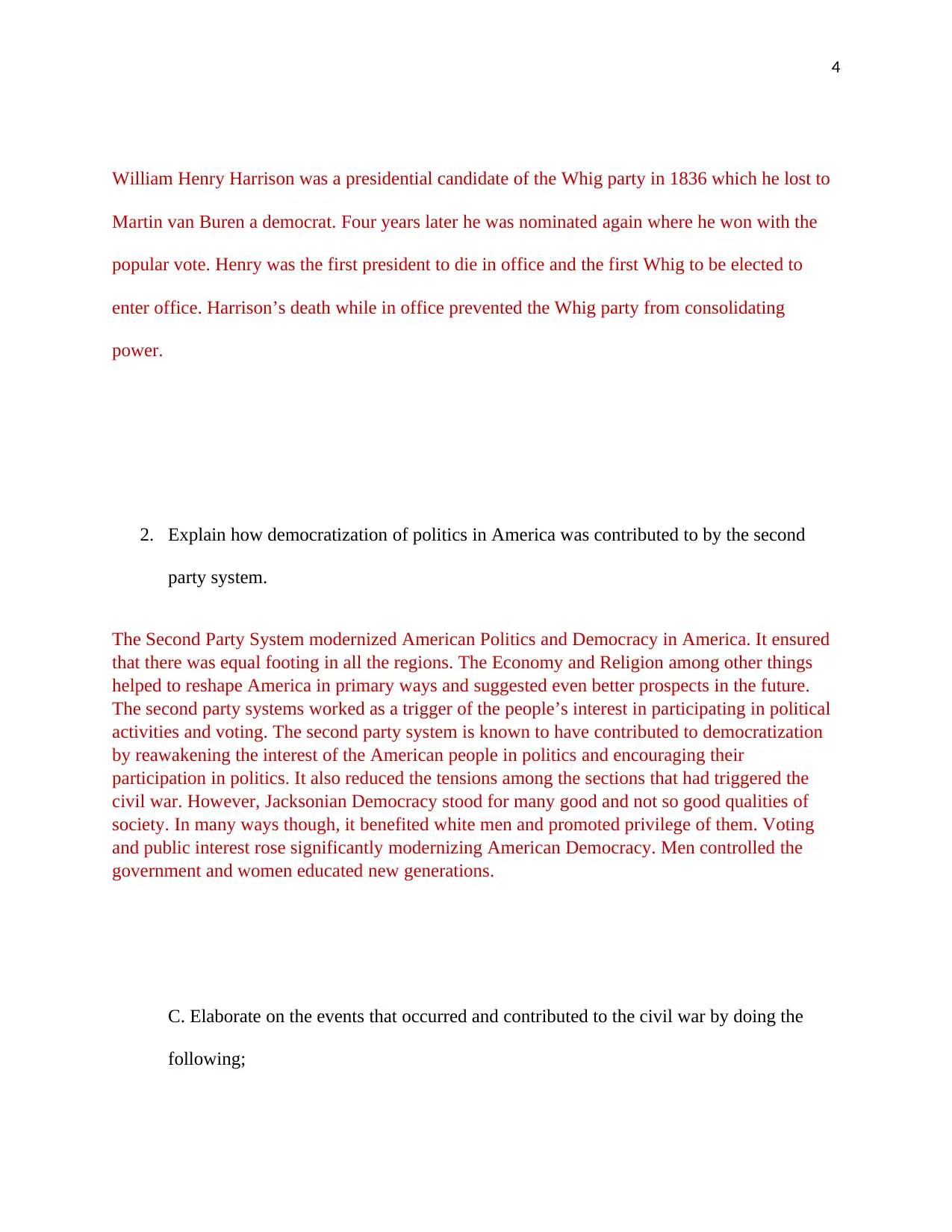
4
William Henry Harrison was a presidential candidate of the Whig party in 1836 which he lost to
Martin van Buren a democrat. Four years later he was nominated again where he won with the
popular vote. Henry was the first president to die in office and the first Whig to be elected to
enter office. Harrison’s death while in office prevented the Whig party from consolidating
power.
2. Explain how democratization of politics in America was contributed to by the second
party system.
The Second Party System modernized American Politics and Democracy in America. It ensured
that there was equal footing in all the regions. The Economy and Religion among other things
helped to reshape America in primary ways and suggested even better prospects in the future.
The second party systems worked as a trigger of the people’s interest in participating in political
activities and voting. The second party system is known to have contributed to democratization
by reawakening the interest of the American people in politics and encouraging their
participation in politics. It also reduced the tensions among the sections that had triggered the
civil war. However, Jacksonian Democracy stood for many good and not so good qualities of
society. In many ways though, it benefited white men and promoted privilege of them. Voting
and public interest rose significantly modernizing American Democracy. Men controlled the
government and women educated new generations.
C. Elaborate on the events that occurred and contributed to the civil war by doing the
following;
William Henry Harrison was a presidential candidate of the Whig party in 1836 which he lost to
Martin van Buren a democrat. Four years later he was nominated again where he won with the
popular vote. Henry was the first president to die in office and the first Whig to be elected to
enter office. Harrison’s death while in office prevented the Whig party from consolidating
power.
2. Explain how democratization of politics in America was contributed to by the second
party system.
The Second Party System modernized American Politics and Democracy in America. It ensured
that there was equal footing in all the regions. The Economy and Religion among other things
helped to reshape America in primary ways and suggested even better prospects in the future.
The second party systems worked as a trigger of the people’s interest in participating in political
activities and voting. The second party system is known to have contributed to democratization
by reawakening the interest of the American people in politics and encouraging their
participation in politics. It also reduced the tensions among the sections that had triggered the
civil war. However, Jacksonian Democracy stood for many good and not so good qualities of
society. In many ways though, it benefited white men and promoted privilege of them. Voting
and public interest rose significantly modernizing American Democracy. Men controlled the
government and women educated new generations.
C. Elaborate on the events that occurred and contributed to the civil war by doing the
following;
Paraphrase This Document
Need a fresh take? Get an instant paraphrase of this document with our AI Paraphraser
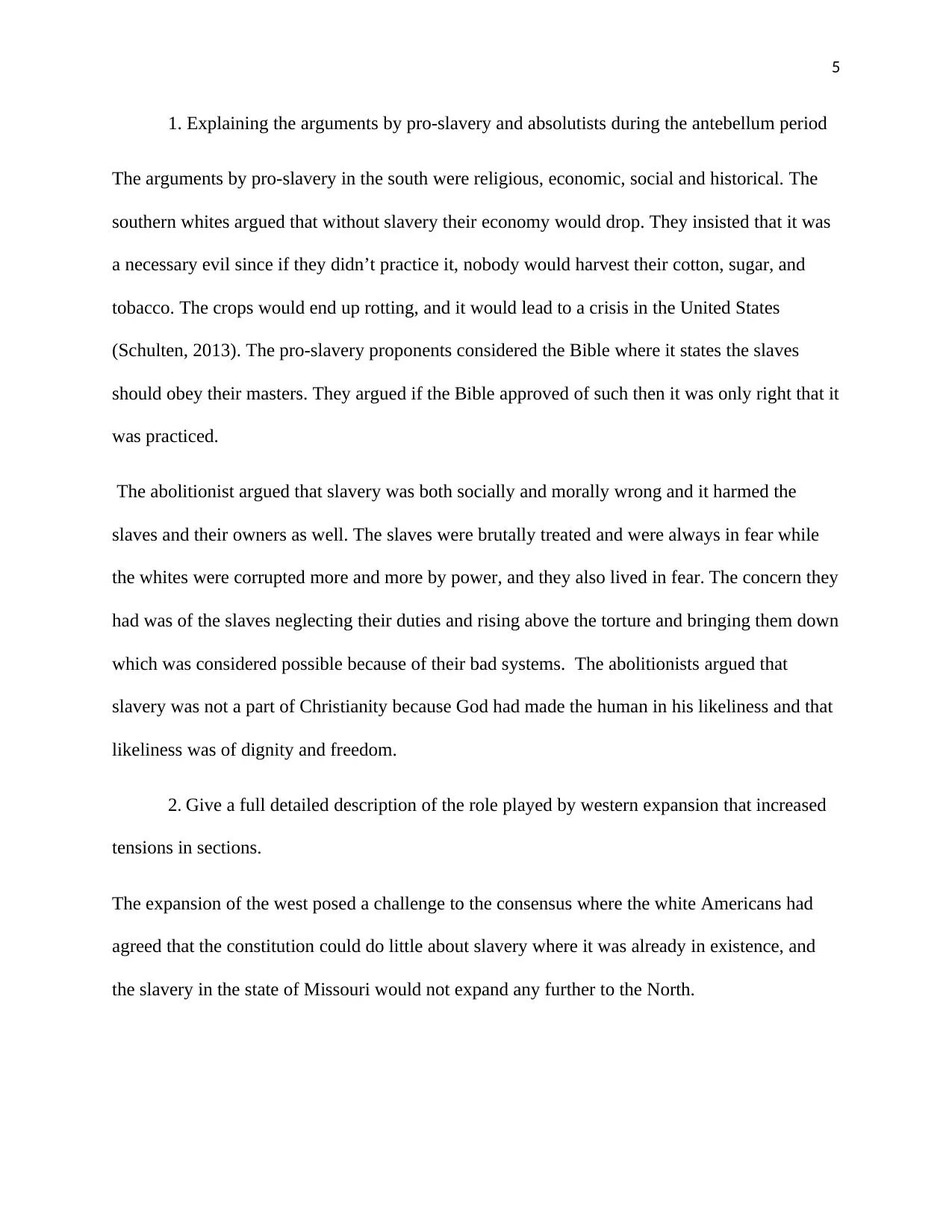
5
1. Explaining the arguments by pro-slavery and absolutists during the antebellum period
The arguments by pro-slavery in the south were religious, economic, social and historical. The
southern whites argued that without slavery their economy would drop. They insisted that it was
a necessary evil since if they didn’t practice it, nobody would harvest their cotton, sugar, and
tobacco. The crops would end up rotting, and it would lead to a crisis in the United States
(Schulten, 2013). The pro-slavery proponents considered the Bible where it states the slaves
should obey their masters. They argued if the Bible approved of such then it was only right that it
was practiced.
The abolitionist argued that slavery was both socially and morally wrong and it harmed the
slaves and their owners as well. The slaves were brutally treated and were always in fear while
the whites were corrupted more and more by power, and they also lived in fear. The concern they
had was of the slaves neglecting their duties and rising above the torture and bringing them down
which was considered possible because of their bad systems. The abolitionists argued that
slavery was not a part of Christianity because God had made the human in his likeliness and that
likeliness was of dignity and freedom.
2. Give a full detailed description of the role played by western expansion that increased
tensions in sections.
The expansion of the west posed a challenge to the consensus where the white Americans had
agreed that the constitution could do little about slavery where it was already in existence, and
the slavery in the state of Missouri would not expand any further to the North.
1. Explaining the arguments by pro-slavery and absolutists during the antebellum period
The arguments by pro-slavery in the south were religious, economic, social and historical. The
southern whites argued that without slavery their economy would drop. They insisted that it was
a necessary evil since if they didn’t practice it, nobody would harvest their cotton, sugar, and
tobacco. The crops would end up rotting, and it would lead to a crisis in the United States
(Schulten, 2013). The pro-slavery proponents considered the Bible where it states the slaves
should obey their masters. They argued if the Bible approved of such then it was only right that it
was practiced.
The abolitionist argued that slavery was both socially and morally wrong and it harmed the
slaves and their owners as well. The slaves were brutally treated and were always in fear while
the whites were corrupted more and more by power, and they also lived in fear. The concern they
had was of the slaves neglecting their duties and rising above the torture and bringing them down
which was considered possible because of their bad systems. The abolitionists argued that
slavery was not a part of Christianity because God had made the human in his likeliness and that
likeliness was of dignity and freedom.
2. Give a full detailed description of the role played by western expansion that increased
tensions in sections.
The expansion of the west posed a challenge to the consensus where the white Americans had
agreed that the constitution could do little about slavery where it was already in existence, and
the slavery in the state of Missouri would not expand any further to the North.
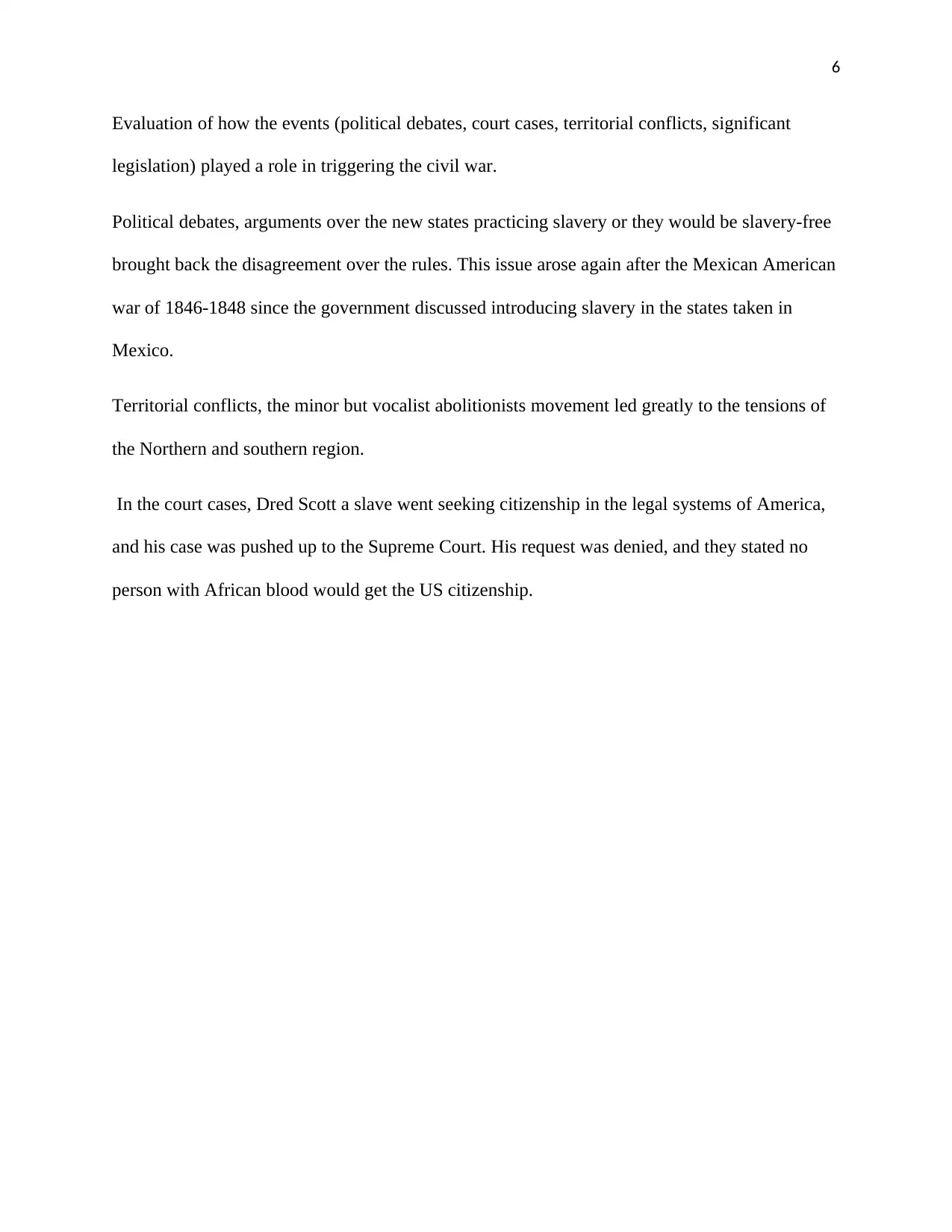
6
Evaluation of how the events (political debates, court cases, territorial conflicts, significant
legislation) played a role in triggering the civil war.
Political debates, arguments over the new states practicing slavery or they would be slavery-free
brought back the disagreement over the rules. This issue arose again after the Mexican American
war of 1846-1848 since the government discussed introducing slavery in the states taken in
Mexico.
Territorial conflicts, the minor but vocalist abolitionists movement led greatly to the tensions of
the Northern and southern region.
In the court cases, Dred Scott a slave went seeking citizenship in the legal systems of America,
and his case was pushed up to the Supreme Court. His request was denied, and they stated no
person with African blood would get the US citizenship.
Evaluation of how the events (political debates, court cases, territorial conflicts, significant
legislation) played a role in triggering the civil war.
Political debates, arguments over the new states practicing slavery or they would be slavery-free
brought back the disagreement over the rules. This issue arose again after the Mexican American
war of 1846-1848 since the government discussed introducing slavery in the states taken in
Mexico.
Territorial conflicts, the minor but vocalist abolitionists movement led greatly to the tensions of
the Northern and southern region.
In the court cases, Dred Scott a slave went seeking citizenship in the legal systems of America,
and his case was pushed up to the Supreme Court. His request was denied, and they stated no
person with African blood would get the US citizenship.
⊘ This is a preview!⊘
Do you want full access?
Subscribe today to unlock all pages.

Trusted by 1+ million students worldwide
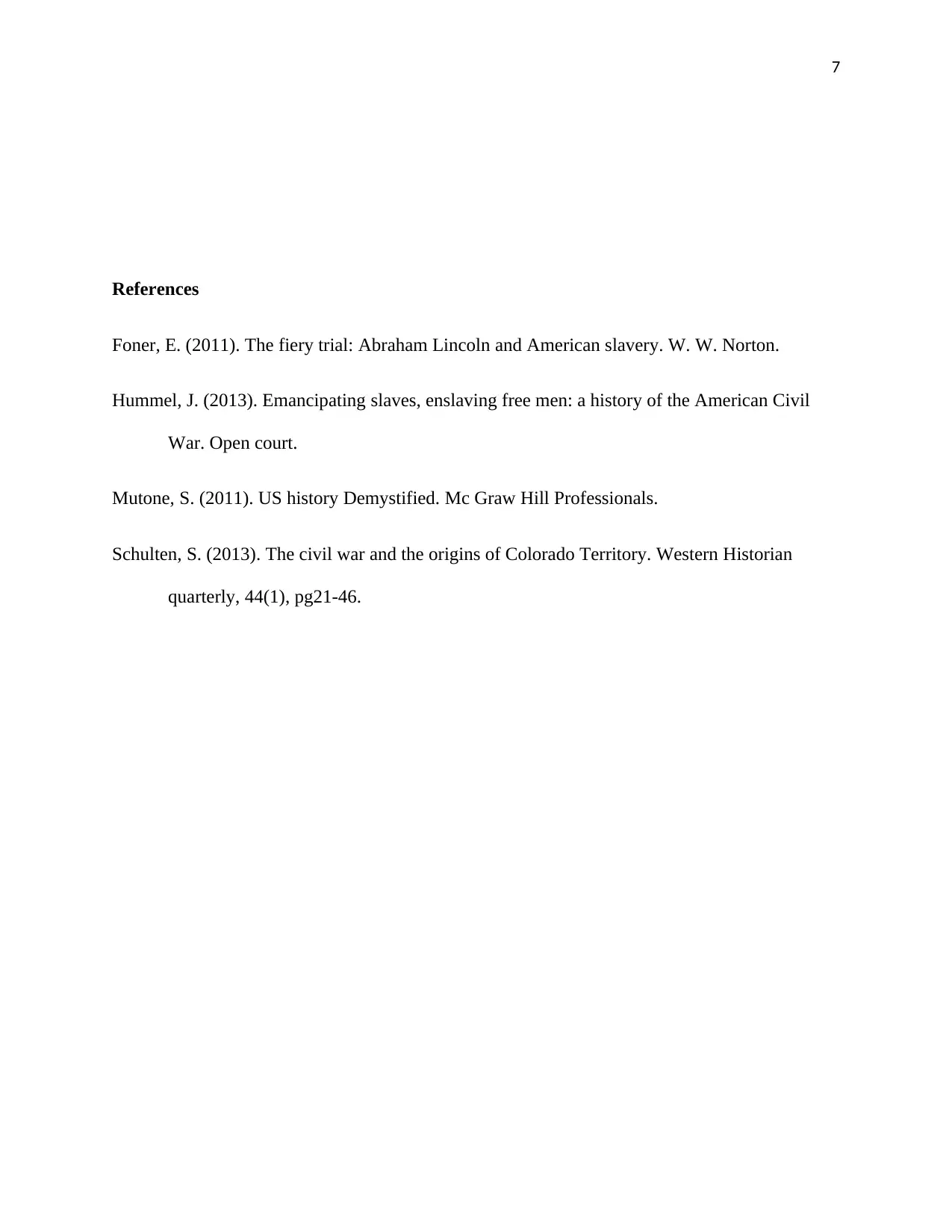
7
References
Foner, E. (2011). The fiery trial: Abraham Lincoln and American slavery. W. W. Norton.
Hummel, J. (2013). Emancipating slaves, enslaving free men: a history of the American Civil
War. Open court.
Mutone, S. (2011). US history Demystified. Mc Graw Hill Professionals.
Schulten, S. (2013). The civil war and the origins of Colorado Territory. Western Historian
quarterly, 44(1), pg21-46.
References
Foner, E. (2011). The fiery trial: Abraham Lincoln and American slavery. W. W. Norton.
Hummel, J. (2013). Emancipating slaves, enslaving free men: a history of the American Civil
War. Open court.
Mutone, S. (2011). US history Demystified. Mc Graw Hill Professionals.
Schulten, S. (2013). The civil war and the origins of Colorado Territory. Western Historian
quarterly, 44(1), pg21-46.
1 out of 7
Your All-in-One AI-Powered Toolkit for Academic Success.
+13062052269
info@desklib.com
Available 24*7 on WhatsApp / Email
![[object Object]](/_next/static/media/star-bottom.7253800d.svg)
Unlock your academic potential
Copyright © 2020–2026 A2Z Services. All Rights Reserved. Developed and managed by ZUCOL.

